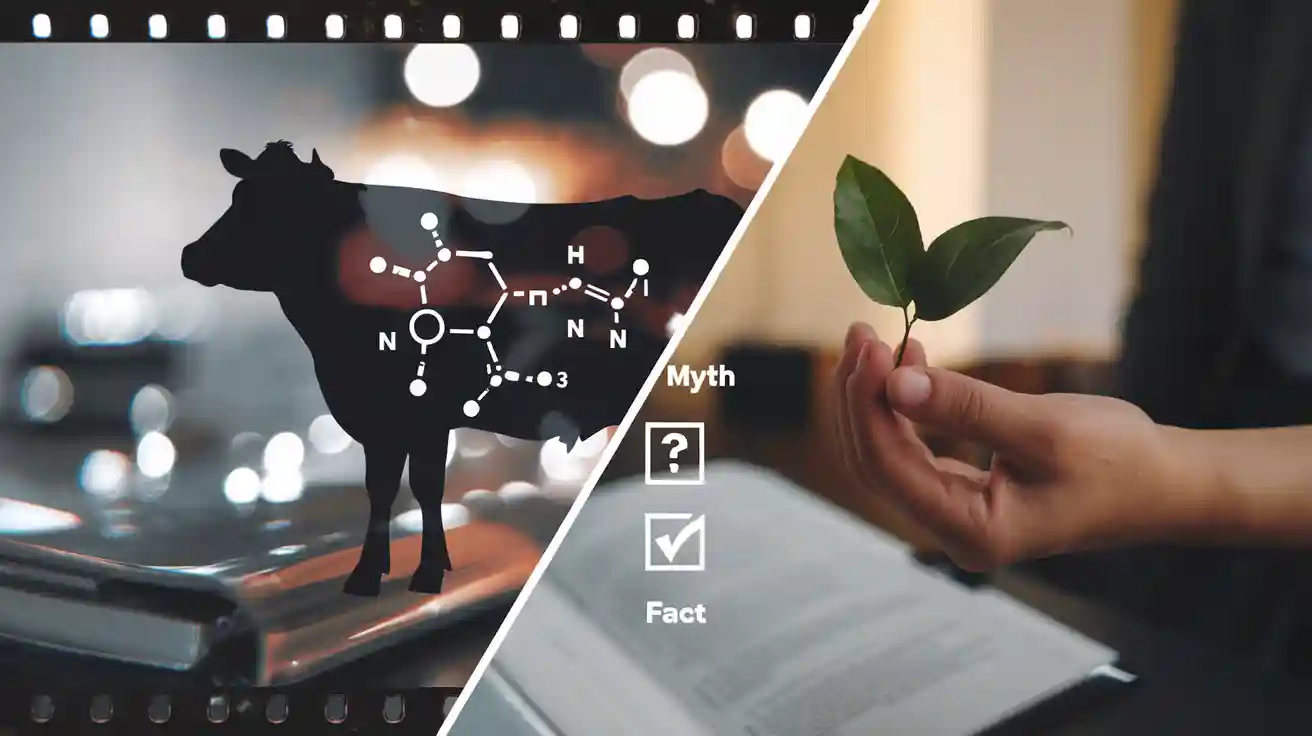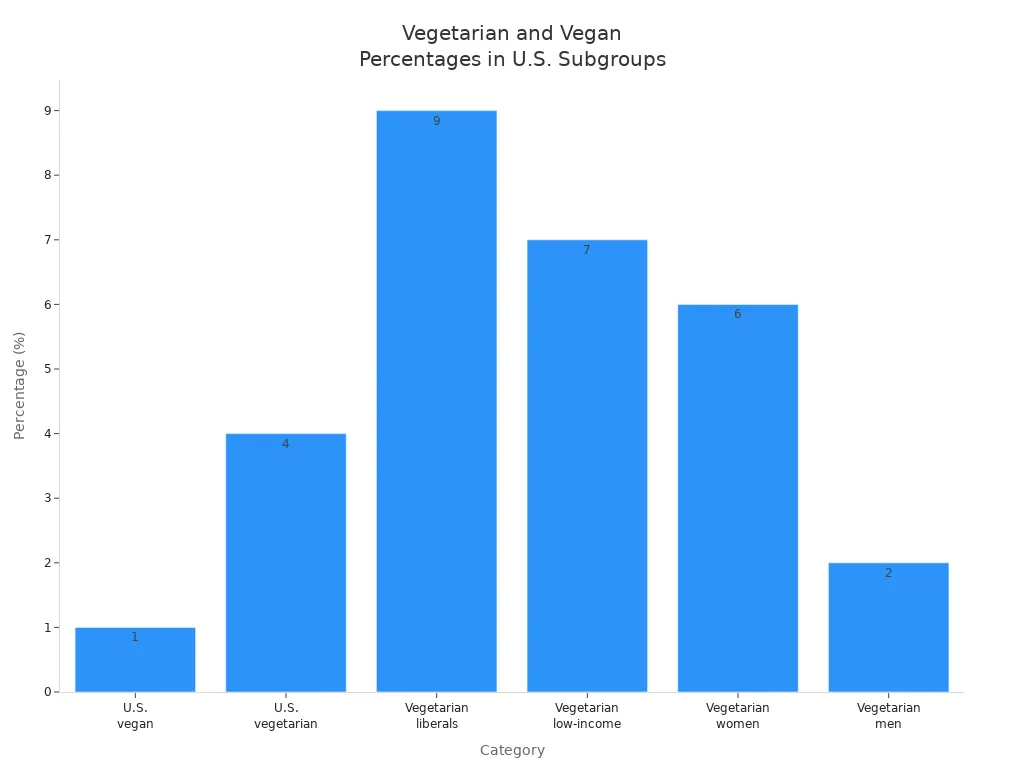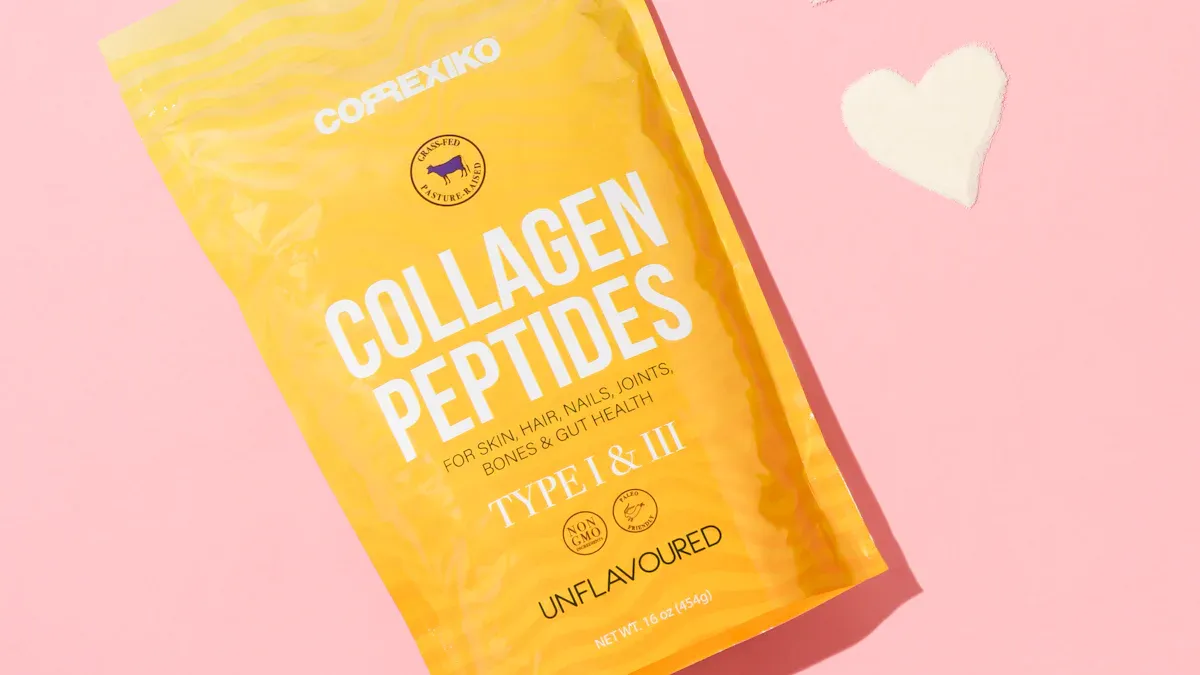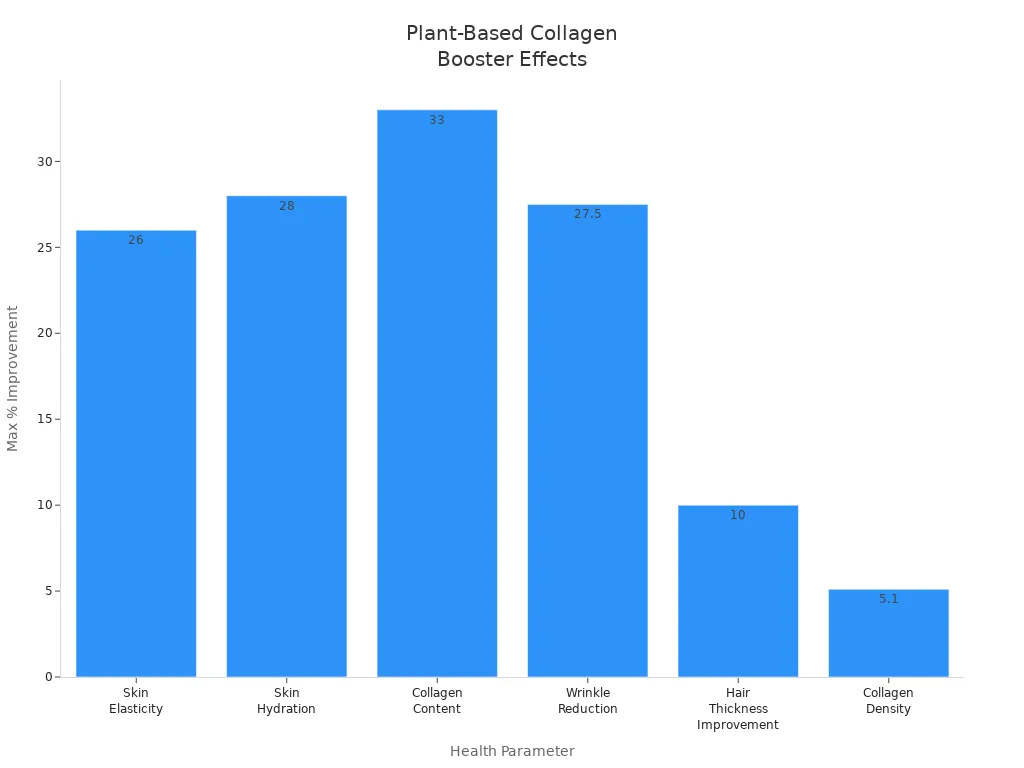Bovine Collagen Explained: Myths vs Facts for Vegans
Table of Contents

Bovine collagen comes from cows, so it does not fit vegan standards. You may care about this if you want a plant-based or vegetarian lifestyle. Many people in the United States choose vegan or vegetarian diets, as shown in the table below.
| Category | Percentage / Number |
|---|---|
| U.S. adults identifying as vegan | 1% |
| U.S. adults identifying as vegetarian | 4% |
| U.S. adults following either vegan or vegetarian diet | Less than 5% |
| Overlap (both vegan and vegetarian) | Less than 1% |
| Vegetarian by political affiliation (liberals) | 9% |
| Vegetarian by income (low-income adults) | 7% |
| Vegetarian by gender (women) | 6% |
| Vegetarian by gender (men) | 2% |
| Vegan percentage across subgroups | 1% to 3% range |

You should look for clear product labels and check ingredients. Vegan collagen supplements do not contain real collagen but help your body make its own. If you want to avoid animal products, accurate information will help you choose the best option.
Bovine Collagen Basics

What Is Bovine Collagen
You may see many products that mention collagen, but not all collagen is the same. Bovine collagen comes from cows. It is a protein that helps build your skin, bones, muscles, and joints. When you look at the main types of collagen, you will find that bovine collagen contains mostly types I and III. These types are also found in your skin and help keep it firm and smooth. Type II collagen, which is also present in bovine collagen, supports your joints and cartilage.
Did you know? Collagen peptides are smaller pieces of collagen that your body can absorb more easily. Many supplements use collagen peptides because they work better in your system.
Here is a table that compares bovine collagen with other animal sources:
| Aspect | Bovine Collagen | Marine Collagen | Chicken Collagen |
|---|---|---|---|
| Main Collagen Types | Types I, II, and III (most abundant I & III) | Mostly Type I, small amounts of Type II, no Type III | Types I, II, and III |
| Source | Cowhides, bones, tendons, muscles of cattle and related bovine species | Fish skin, scales, bones | Chicken tissues |
| Particle Size | Larger particles, processed into hydrolyzed peptides for better absorption | Smaller particles, absorbed more efficiently | Intermediate particle size |
| Amino Acid Content | Rich in glycine and proline, supports joint repair, muscle growth, skin healing | Less diverse amino acid profile, mainly supports skin, hair, nails | Similar to bovine but may cause more immune reactions |
| Health Benefits | Supports skin, bones, tendons, ligaments, muscles, blood vessels, joints, and athletic performance | Primarily supports skin, hair, nail health; less effective for joints and bones | Similar benefits to bovine but with higher risk of side effects |
| Allergic Reactions | Generally well tolerated, fewer side effects | Potential for allergic reactions, fishy odor | May cause mild to moderate side effects |
| Cost and Availability | Cost-effective, abundant due to beef industry by-products | More expensive, less abundant | Less commonly used in supplements |
Bovine collagen is rich in glycine and proline. These amino acids help your body repair joints, grow muscles, and heal skin. Collagen peptides from cows are popular because they are easy to find and cost less than marine collagen. Collagen research shows that these peptides can help with skin and joint health.
How It’s Sourced
You might wonder how companies get collagen from cows. The process starts with by-products from the beef industry, such as hides, bones, and tendons. Here is a simple breakdown of how bovine collagen becomes the collagen powder you see in stores:
- Workers collect and clean cow hides, bones, and tendons.
- Factories use heat and enzymes to break down the collagen into smaller pieces called collagen peptides.
- The liquid is filtered to remove unwanted parts.
- The collagen is purified using special filters.
- The final step dries the collagen into a powder for supplements.
Note: Collagen extraction uses a lot of resources. Cattle farming can lead to deforestation, especially in places like the Amazon. It also produces greenhouse gases and uses large amounts of water and feed. Some companies promise to use better methods, but not all do.
Bovine collagen is a big business. In 2024, the global market for these products reached $8.7 billion. Experts expect it to grow to over $21 billion by 2033, with the largest markets in Asia Pacific and Europe. Most bovine collagen goes into medicines and cosmetics.
Bovine Collagen and Vegan Diets
Animal-Derived Protein
You may see many supplements that promise to boost your health. Some of these products use animal-derived protein. Bovine collagen is one of the most common examples. Companies make it from cow hides, bones, and tendons. This protein helps build your skin, joints, and muscles. You will not find collagen in any plant food.
Collagen is a special protein. It forms the connective tissue in animals. You can find it in bones, skin, muscles, tendons, and cartilage. Harvard Nutrition Source explains that collagen only exists in animal flesh, such as meat and fish. Plants do not make collagen. They only provide nutrients that help your body make its own collagen. This is a key fact that many people miss when they hear about vegan collagen.
Supplements often use other animal proteins too. Here are some common sources:
- Meat meal
- Feather meal
- Blood meal
- Fish meal
- Milk protein sources
You can see these sources in the table below:
| Animal-Derived Protein Source | Description |
|---|---|
| Meat and Bone Meal | Made from animal bones and tissues from cattle, swine, and sheep butchery. Used as a protein and mineral source in supplements. |
| Blood Meal | By-product from meatpacking, rich in protein, used in supplement feed. |
| Feather Meal | By-product from rendering plants, used as an animal protein supplement. |
| Fish Meal | Comes from fish processing, used as a protein source. |
| Milk Protein Sources | Proteins from milk, used in dietary supplements. |
If you follow a vegan or vegetarian diet, you need to check labels. Many supplements use animal by-products. Vegan collagen products do not contain real collagen. They use plant-based ingredients to help your body make its own collagen.
📝 Tip: Always read the ingredient list. If you see words like “hydrolyzed collagen,” “gelatin,” or “animal protein,” the product is not vegan or vegetarian.
Vegan Restrictions
You may wonder why vegan collagen is different from regular collagen. The answer is simple. Vegan means no animal products at all. Vegan organizations set strict rules for what counts as vegan. The Vegan Trademark says that vegan products must not have any animal-derived ingredients or by-products. They also must not use animal testing during development or production. This rule covers all supplements, including those that claim to support collagen.
In the United States, there is no federal law that controls how companies use the word “vegan” on labels. Different vegan groups and third-party certifiers use their own standards. They check ingredient sources and make sure companies try to prevent cross-contamination. Some groups, like Vegan Action, give out logos to show that a product meets vegan standards. Most certifiers do not do on-site inspections, but they require companies to clean equipment between runs and follow sanitation rules.
You need to know that not all vegan labels mean the same thing. Some companies use the word “vegan” for marketing, even if the product does not meet strict vegan standards. Always look for trusted certification logos and read the label carefully.
❗ Myth vs Fact:
- Myth: All collagen supplements can be vegan if they use plant-based ingredients.
- Fact: Collagen only comes from animals. Vegan collagen products do not contain real collagen. They use plant nutrients to help your body make its own collagen.
If you are vegan or vegetarian, you must avoid animal-derived collagen. Vegan collagen boosters are a better choice. These products use vitamins, minerals, and plant extracts to support your body’s natural collagen production. You can stay true to your vegan values and still care for your skin and joints.
Collagen Myths for Vegans
“Vegan Collagen” Products
You may see many products labeled as “vegan collagen” in stores or online. This label can be confusing. The truth is, collagen is a protein that only comes from animals. Plants do not make collagen. This is a common myth. When you buy a vegan collagen supplement, you are not getting real collagen. Instead, you get a mix of plant-based nutrients that help your body make its own collagen.
Here are some common collagen myths you might hear:
- Vegan collagen comes from plants.
- Vegan collagen supplements give you real collagen.
- All collagen supplements are vegan.
- Plant-based collagen is the same as animal collagen.
- Collagen supplements can reverse aging.
- Protein shakes work the same as collagen boosters.
- Marine collagen is better than bovine collagen.
- Collagen lost by your body cannot be restored.
- Collagen supplements are the only way to increase collagen.
- Vegan collagen products contain collagen molecules.
🛑 Note: Vegan collagen does not exist as a direct plant-derived protein. Vegan products are actually collagen boosters. They provide amino acids and nutrients like vitamin C, zinc, and copper. These help your body make collagen on its own.
You should always check the label. Most vegan collagen supplements do not contain collagen peptides. Instead, they use ingredients that support your body’s natural collagen production. This is why you see words like “collagen builder” or “collagen booster” on the packaging.
Here is a table to help you see the difference:
| Aspect | Traditional Bovine Collagen Supplements | Vegan Collagen Products / Boosters |
|---|---|---|
| Source | Animal connective tissues (bovine hides, bones) | Genetically engineered yeast/bacteria or plant-based ingredients |
| Actual Collagen Content | Real collagen proteins, including collagen peptides | Usually no real collagen; some biotech collagen peptides exist but are rare |
| Structure | Collagen triple helix (native or hydrolyzed forms) | No triple helix; simplified or absent collagen structure |
| Amino Acid Profile | Rich in glycine, proline, hydroxyproline | Different profile; includes amino acids and micronutrients for collagen synthesis |
| Production Scale | Widely available | Limited for engineered collagen; most are boosters |
| Composition | Collagen, peptides | Plant extracts, amino acids, vitamins, minerals |
| Ethical/Sustainability | Animal-derived, ethical concerns | Cruelty-free, more sustainable |
Genetically Engineered Collagen
Some companies use new technology to make collagen without animals. They use yeast or bacteria in a lab to create collagen peptides. This process is called genetic engineering. These products are rare and not as common as plant-based collagen boosters.
Scientists have tested these lab-made collagens. Studies show that genetically engineered collagen can help your skin. It can improve skin density, elasticity, and reduce wrinkles. In some tests, it worked as well as or better than animal collagen. Genetically engineered collagen also has other benefits. It is disease-free, has uniform quality, and lowers the risk of allergies. It is also better for the environment.
💡 Tip: Genetically engineered collagen is still new. Most vegan collagen supplements do not use this type yet. You will usually find plant-based collagen boosters instead.
Collagen Boosters vs Collagen
You may wonder if collagen boosters work as well as collagen supplements. This is another common myth. Collagen boosters do not contain collagen. They give your body the building blocks it needs to make collagen. These include amino acids like glycine, proline, and lysine, plus vitamins and minerals.
Collagen supplements from animals give you pre-formed collagen peptides. Your body absorbs these and uses them to repair skin, joints, and bones. Plant-based collagen boosters work differently. They help your body make its own collagen by providing key nutrients.
Here are the main ingredients you will find in vegan collagen boosters and their benefits:
| Ingredient | Function in Collagen Support and Health Benefits |
|---|---|
| Vitamin C | Helps your body make collagen; strengthens collagen fibers |
| Vitamin A | Supports skin cell growth and collagen formation |
| Vitamin E | Protects collagen from damage; keeps skin hydrated |
| D-Biotin | Strengthens hair, skin, and nails |
| Silica | Boosts collagen; improves skin and bone health |
| Hyaluronic Acid | Increases skin hydration and elasticity |
| Amino Acids | Building blocks for collagen production |
| Zinc | Repairs skin and keeps collagen strong |
You can find these nutrients in foods like citrus fruits, broccoli, nuts, seeds, and leafy greens. Eating a diet rich in these foods gives your body what it needs to make collagen naturally.
✅ Remember: Collagen boosters can be just as effective as animal collagen supplements if you use them regularly and eat a healthy diet. Vitamin C is especially important for collagen synthesis.
Many people believe the myth that only animal collagen supplements work. In fact, studies show that vegan collagen boosters can improve skin, hair, and joint health. They also offer the benefit of being cruelty-free and better for the planet.
Quick Facts: Collagen Myths vs Facts
- Collagen is only found in animals, not plants.
- Vegan collagen supplements are actually collagen boosters.
- Genetically engineered collagen is rare but promising.
- Collagen boosters use vitamins, minerals, and amino acids to help your body make collagen.
- Both animal and plant-based collagen supplements can offer benefits for your skin and joints.
Vegan Collagen Alternatives

Plant-Based Nutrients
You can support your skin health and joint function with plant-based collagen boosters. These vegan alternatives do not contain collagen itself. Instead, they give your body the nutrients needed to make collagen naturally. When you choose plant-based collagen supplements, you help your body build collagen using amino acids, vitamins, and minerals found in plants.
Clinical studies show that plant-based collagen supplementation can increase collagen content by 33%, improve skin elasticity by 26%, and boost hydration by 28% after four weeks. These benefits come from nutrients like glycine, proline, lysine, vitamin C, zinc, and silica. Vitamin C helps your body convert proline into hydroxyproline, which keeps collagen stable. Zinc and silica act as cofactors in collagen production.
Here is a table showing plant-based foods rich in collagen-supporting nutrients:
| Nutrient | Role in Collagen Production | Plant-Based Food Sources |
|---|---|---|
| Vitamin C | Cofactor for collagen synthesis, antioxidant protection | Oranges, strawberries, bell peppers, kiwi, leafy greens |
| Amino Acids (glycine, proline) | Building blocks of collagen protein | Legumes, nuts, seeds |
| Zinc | Activates enzymes for collagen production, tissue repair | Nuts, seeds, lentils |
| Copper | Maintains collagen structure | Cashews, lentils |
| Vitamin A | Supports collagen synthesis and skin cell turnover | Carrots, sweet potatoes, leafy greens |
| Healthy Fats (Omega-3) | Supports skin health, reduces inflammation | Flaxseeds, walnuts |
Supporting Collagen Production
You can boost collagen naturally by eating a well-balanced diet full of plant proteins and colorful fruits and vegetables. Plant-based collagen supplements work by giving your body the building blocks for collagen. These supplements do not replace collagen but help your body make more of it.
Tip: Protect your skin by using sunscreen, drinking plenty of water, and getting enough sleep. These habits help maintain collagen and improve skin health.
Plant-based collagen boosters offer benefits for your skin, hair, and joints. You may see improvements in skin hydration, elasticity, and wrinkle reduction. Some studies show that vegan collagen supplements can reduce wrinkles by up to 27.5% and increase hair thickness by 10%. The chart below shows how plant-based collagen boosters improve skin health compared to other supplements.

Choosing vegan alternatives also helps the environment. Plant-based collagen supplements use fewer resources and produce less pollution than bovine collagen. You support sustainability and ethical nutrition when you pick these options.
You always find collagen in animal products like bovine collagen. If you want vegan benefits for skin health and joint support, choose plant-based supplement options. Read supplement labels carefully to avoid animal-derived ingredients. Vegan collagen boosters supply nutrients that help your body make collagen, improving skin and joint wellness. You support ethical and allergy-friendly choices when you pick vegan supplements. Remember, a balanced diet with fruits, nuts, and seeds boosts natural collagen production.
Tip: Look for trusted vegan certifications and ask questions about supplement ingredients to protect your skin and joint health.
FAQ
What makes bovine collagen different from vegan collagen supplements?
Bovine collagen comes from cows. Vegan collagen supplements use plant-based collagen boosters. You do not get real collagen from vegan alternatives, but you get nutrients that help your body make collagen. This is a key fact for anyone following a vegan or vegetarian lifestyle.
Can plant-based collagen supplements improve my skin health and joint function?
Yes, plant-based collagen supplements can support your skin and joint health. These supplements provide vitamins, minerals, and plant proteins. You get the benefit of supporting collagen production without animal products. A well-balanced diet with these nutrients helps your body maintain healthy skin and joints.
Is it a myth that vegan collagen powder contains real collagen peptides?
Yes, it is a myth. Vegan collagen powder does not contain real collagen peptides. Only animal sources like bovine collagen provide collagen peptides. Vegan collagen supplementation uses plant-based ingredients to help your body make its own collagen. Always check the label for this important fact.
What are the main benefits of choosing vegan alternatives for collagen supplementation?
You support ethical nutrition and sustainability when you choose vegan alternatives. These supplements help your body make collagen naturally. You also avoid animal products and support a healthy diet. Many people see benefits for skin health, joint support, and overall wellness.
How can I boost collagen naturally with a vegetarian or vegan diet?
You can eat more plant proteins, fruits, and vegetables. These foods give your body the nutrients needed for collagen production. A well-balanced diet with vitamin C, zinc, and copper supports collagen synthesis. This approach helps you enjoy the benefits of collagen without animal supplements.

Poseidon
Master of Nutritional Epidemiology, University of Copenhagen, Herbal Functional Nutrition Researcher
Focus: The scientific application of natural active ingredients such as Tongo Ali, Horny Goat Weed, and Maca to sexual health and metabolic regulation.
Core Focus:
Men: Use a combination of Tongo Ali (an energizing factor) + Maca (an energy reserve) to improve low energy and fluctuating libido.
Women: Use a combination of Horny Goat Weed (a gentle regulator) + Maca (a nutritional synergist) to alleviate low libido and hormonal imbalances.
Stressed/Middle-Aged Adults: This triple-ingredient synergy supports metabolism, physical strength, and intimacy.
Product Concept:
Based on traditional applications and modern research (e.g., Tongo Ali promotes testosterone-enhancing enzyme activity, and icariin provides gentle regulation), we preserve core active ingredients and eschew conceptual packaging—using natural ingredients to address specific needs.
Simply put: I'm a nutritionist who understands "herbal actives." I use scientifically proven ingredients like Tongo Ali, Epimedium, and Maca to help you make "sexual health" and "nutritional support" a daily routine.
